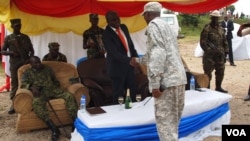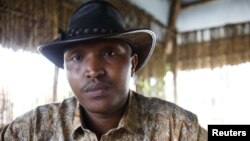GOMA —
The text of a proposed peace agreement between the Democratic Republic of Congo's (DRC's) government and rebel group M23 has apparently been leaked to the media. The rebels, who took over parts of eastern Congo last year, were scheduled to sign an agreement earlier this month but didn't.
VOA obtained the purported text of the agreement Wednesday, a few days after it began circulating in political circles in the DRC capital, Kinshasa.
The document has 12 articles, including a pledge by the rebel group to lay down their arms, and a promise by the government to give amnesty to M23 members not guilty of war crimes and to integrate their fighters into the government army.
The draft says integration of M23 officers will not be automatic but considered on a case by case basis. It also commits the government to help Congolese refugees return home, to set up reconciliation committees and to decentralize power.
Analyst Maria Lange, who’s the director of the NGO International Alert’s program in DRC, thinks the document is genuine.
"It certainly looks like a genuine draft," she said. "Lambert Mende, the communications minister, publicly announced that an agreement would be signed on March 15, and given that this document is dated March 15 I would assume that this is the text the Congolese government drew up for signature on March 15 but which was not signed by M23."
The government has not said if this is a genuine draft. But analyst Thierry Vircoulon of the International Crisis Group agrees with Lange that it probably is.
Both analysts say it’s not surprising the M23 didn’t sign it on March 15 as the rebels were fighting each other at the time. That struggle is now over and the losing side has fled to Rwanda where its leader Bosco Ntaganda has turned himself in at the U.S. Embassy.
The civilian leader of M23's dominant faction, Bertrand Bisimwa, has told the media that the document is not binding on his group.
He also said he was surprised to see such a document as the parties to peace talks have not been meeting for a month and previously the mediator was only talking to the other M23 faction.
Vircoulon thinks the text meets most of the rebel group’s main demands.
He tells VOA that while the M23 might make further demands, this text deals with the main issues they have been raising in peace talks.
However, Maria Lange comments that the M23 may not be satisfied with the monitoring mechanism envisioned in the draft.
"It doesn’t provide any kind of monitoring framework outside the U.N. peace framework that was signed on February 24. But that peace framework is at a regional level between states in the region and makes no mention of M23," said Lange.
The text also talks about setting up a community police force. Vircoulon suggests that some M23 combatants might join this force, to protect their communities, rather than joining the army and being posted away from their region.
But Lange comments that the community police force proposal is vague and the M23 will want stronger guarantees of protection for communities that supported them.
VOA obtained the purported text of the agreement Wednesday, a few days after it began circulating in political circles in the DRC capital, Kinshasa.
The document has 12 articles, including a pledge by the rebel group to lay down their arms, and a promise by the government to give amnesty to M23 members not guilty of war crimes and to integrate their fighters into the government army.
The draft says integration of M23 officers will not be automatic but considered on a case by case basis. It also commits the government to help Congolese refugees return home, to set up reconciliation committees and to decentralize power.
Analyst Maria Lange, who’s the director of the NGO International Alert’s program in DRC, thinks the document is genuine.
"It certainly looks like a genuine draft," she said. "Lambert Mende, the communications minister, publicly announced that an agreement would be signed on March 15, and given that this document is dated March 15 I would assume that this is the text the Congolese government drew up for signature on March 15 but which was not signed by M23."
The government has not said if this is a genuine draft. But analyst Thierry Vircoulon of the International Crisis Group agrees with Lange that it probably is.
Both analysts say it’s not surprising the M23 didn’t sign it on March 15 as the rebels were fighting each other at the time. That struggle is now over and the losing side has fled to Rwanda where its leader Bosco Ntaganda has turned himself in at the U.S. Embassy.
The civilian leader of M23's dominant faction, Bertrand Bisimwa, has told the media that the document is not binding on his group.
He also said he was surprised to see such a document as the parties to peace talks have not been meeting for a month and previously the mediator was only talking to the other M23 faction.
Vircoulon thinks the text meets most of the rebel group’s main demands.
He tells VOA that while the M23 might make further demands, this text deals with the main issues they have been raising in peace talks.
However, Maria Lange comments that the M23 may not be satisfied with the monitoring mechanism envisioned in the draft.
"It doesn’t provide any kind of monitoring framework outside the U.N. peace framework that was signed on February 24. But that peace framework is at a regional level between states in the region and makes no mention of M23," said Lange.
The text also talks about setting up a community police force. Vircoulon suggests that some M23 combatants might join this force, to protect their communities, rather than joining the army and being posted away from their region.
But Lange comments that the community police force proposal is vague and the M23 will want stronger guarantees of protection for communities that supported them.





